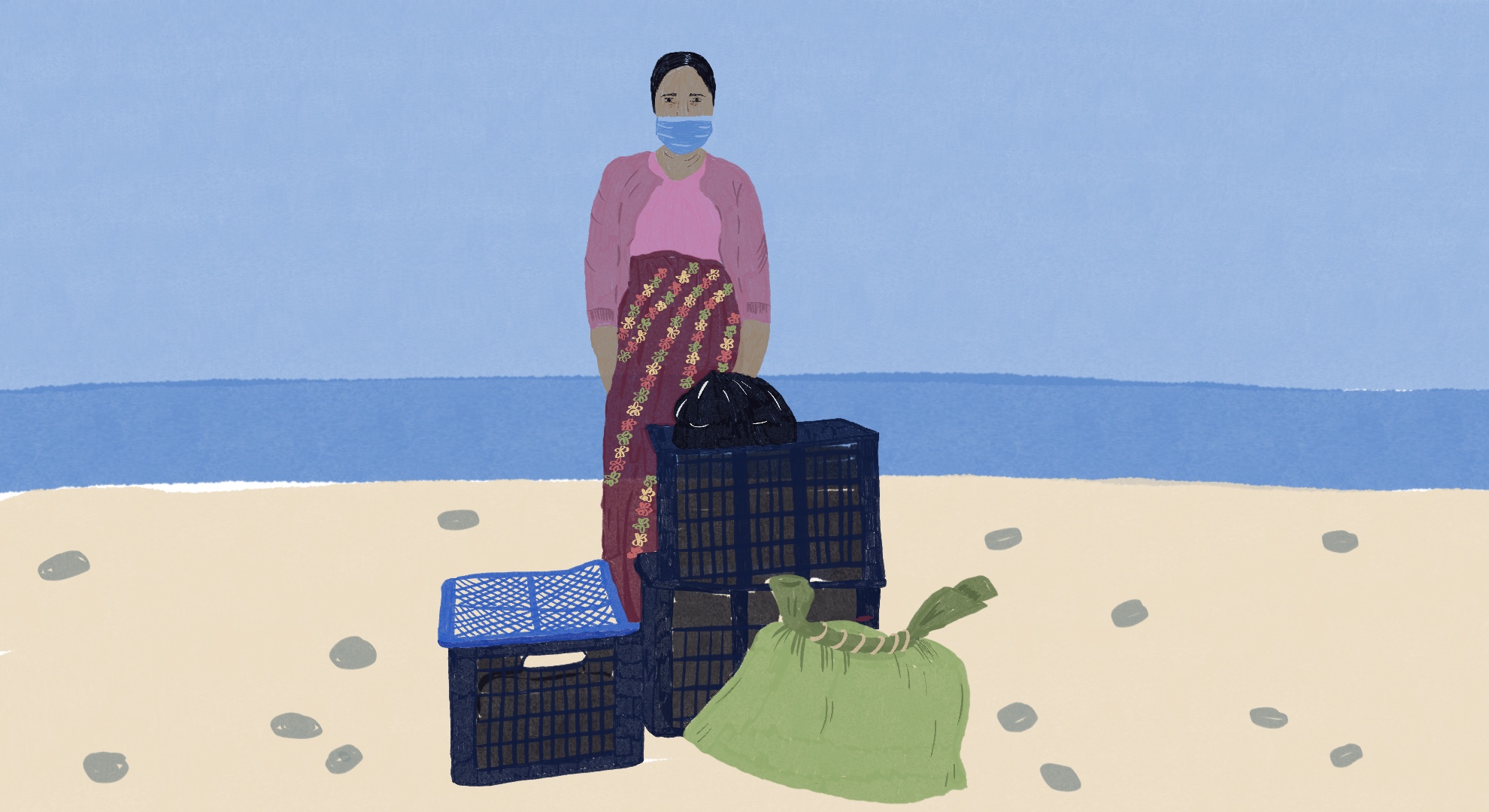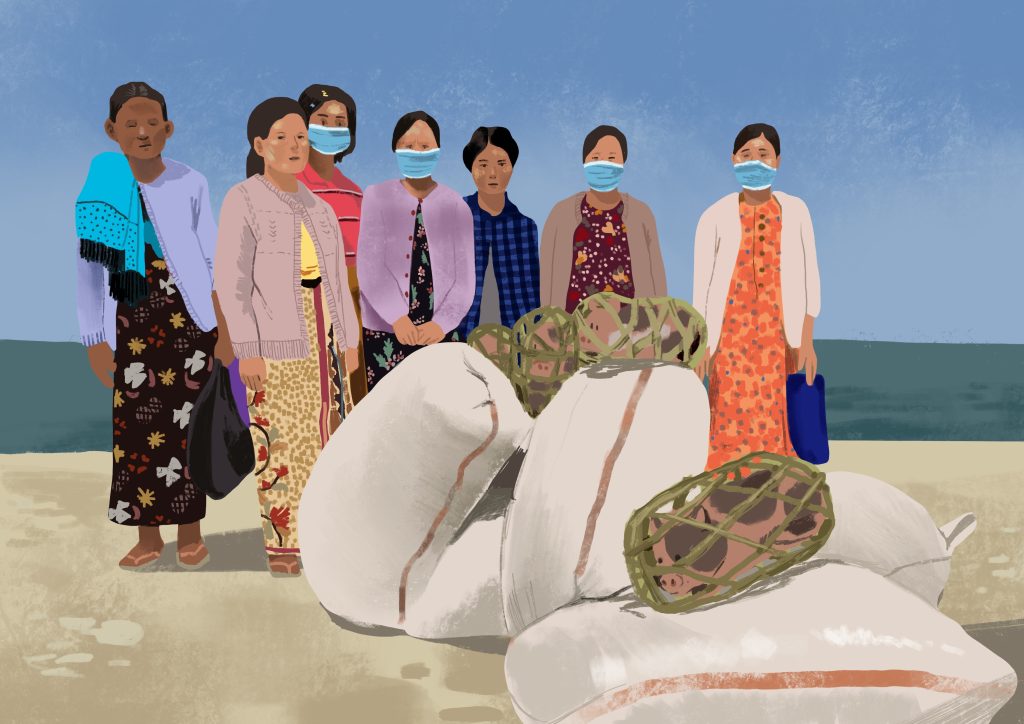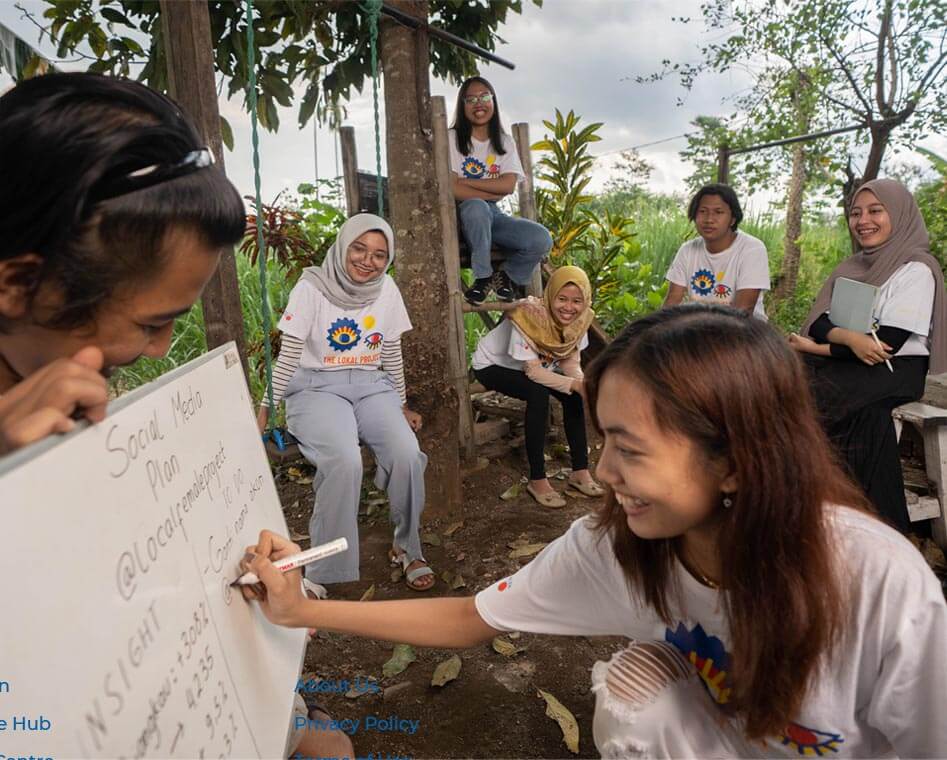A breath of hope for Rohingya women in Myanmar’s Rakhine state

How providing cash, piglets, and business training, as well as essential gender-based violence services, is helping Rohingya survivors of gender-based violence, and those at risk, in Myanmar’s Rakhine state.
Author: Nan Sanhom
Rakhine State, Myanmar – Daw Mya Mya Aye, 60, could not hide her joy as she joined fellow villagers in sharing how the Central Emergency Response Fund (CERF) breathed hope into their vulnerable families.
Speaking at the launch of this year’s International Day for the Elimination of Violence Against Women on 25 November in Matkalar village in Rakhine state, Daw Mya Mya Aye and her fellow beneficiaries explained how through the assistance from CERF they are now slowly rebuilding their lives after the COVID-19 pandemic and the escalation of the armed conflict following the military takeover in February 2021.
“I am happy that the programme gave my life back,” said Daw Mya Mya Aye, a single mother of two. “I received business training, cash, 17 piglets and stock feed to revive my pig business, which had collapsed. The training has improved my pig rearing skills, and the animals are healthier than my previous stock.”
After the armed conflict intensified, risks of gender-based violence increased, including child, forced and early marriages, and human trafficking. Daw Mya Mya Aye said she had seriously considered leaving her country out of desperation. “But I decided to stay here because I could not bear the thought of staying in a refugee camp with my small children.” The military takeover has seen more than 1.4 million people, 200,000 in Rakhine state alone, internally displaced in Myanmar, while more than 950,000 have sought refuge in nearby Bangladesh, Thailand and India.
However, after some weeks of sleepless nights pondering her next move to survive the effects of the conflict, she said a representative of one local women-led organization informed her about a new programme that intended to support vulnerable women. “That was my turning point.”
It is the plight of many women such as Daw Mya Mya Aye that required UN Women and the United Nations Population Fund (UNFPA) to join hands in the CERF-funded global multi-country programme to provide essential services to gender-based violence survivors and enhance their protection from exploitation and abuse. The programme also aimed to help women build back their small businesses for economic independence.
The initiative targets 7,192 women and girls in Rakhine and Kachin states, focusing particularly on survivors of, or those at risk of, gender-based violence.
Through this joint programme, UNFPA is also improving communities’ access to quality and comprehensive prevention and response services for gender-based violence. On the other hand, UN Women is complementing these efforts through provision of cash, business trainings and livelihood support to prevent women from opting for negative coping mechanisms such as selling family livelihood assets, exhausting savings for children’s education and other necessities, transactional sex and forced and child marriages. Support will ensure that women do not respond to difficulties using strategies that may provide a temporary means of survival, but seriously undermine their long-term wellbeing.
The cutting edge of this programme is that UN Women and UNFPA are not working alone. To further promote the localization agenda and expand the reach and access of services, the programme is partnering with 15 local women-led organizations and women’s rights organizations. This partnership is facilitating the capacity development of the women’s organizations for better engagement in humanitarian action, for them to promote reporting of gender-based violence incidents and increase accessibility of essential services such as mental health and psychosocial support and legal aid for delivery of justice.

Working in the camps for internally displaced persons and resettlement sites, the women’s organizations are engaging with various groups of people including community and religious leaders, men and boys to raise awareness on the negative effects of GBV and to improve local capacities to influence behaviour change and address social norms and gender stereotypes that fuel gender-based violence. In Rakhine state, where Daw Mya Mya Aye stays with her family, the programme is supporting 227 women, including 50 female-headed households.
The women were provided with business trainings to help improve their livestock production capacity for economic resilience, as well as in-kind support, namely piglets, chicks, stock feed and cash.
The acting interim UN Women representative in Myanmar, Karin Fueg, emphasized the importance of investing in multi-sectoral gender-based violence services and livelihood opportunities that can strengthen the protection of women and girls in conflict. She said expanding activities that can create opportunities for people to challenge gender norms and address unequal power relations between women and men can help prevent gender-based violence.
Humanitarian actors, she said, should work as a collective and put survivors and women and girls at risk of gender-based violence at the centre of protection efforts, while ensuring that life-saving services are delivered in a timely manner through different mechanisms, such as partnering with local women’s civil society organizations to ease access.
About the CERF-funded programme in Myanmar: The Central Emergency Response Fund (CERF) is a United Nations’ emergency facility established in 2005 to enable humanitarian responders to deliver life-saving assistance whenever and wherever crises strike. In 2021, The United Nations Entity for Gender Equality and the Empowerment of Women (UN Women) and the United Nations Population Fund (UNFPA) were allocated USD 25 million by the CERF Global Grant to strengthen the response to and prevention of gender-based violence in emergencies. With a budget of USD 8 million, UN Women has been implementing the CERF-funded programme from 2021 and will run through 2023 in six countries: Myanmar; Bangladesh (Cox’s Bazar); Cameroon; Colombia; Ethiopia; and Occupied Palestinian Territory. The overall aim of the programme is to provide survivors of gender-based violence and those at risk with multi-sectoral services and livelihood opportunities, and to facilitate their economic empowerment. As part of localization efforts, 30 per cent of the funding has been allocated directly to local women-led organizations and women’s rights organizations, with a view to enhancing their operational capacity, accountability, and prevention of and response interventions to gender-based violence. The programme also contributes to the protection and needs of at-risk marginalized groups. The skills training described in the story are an integral part of the livelihood opportunities provided by two local partner organizations to women living in the internally displaced persons’ camps, including survivors of gender-based violence.

